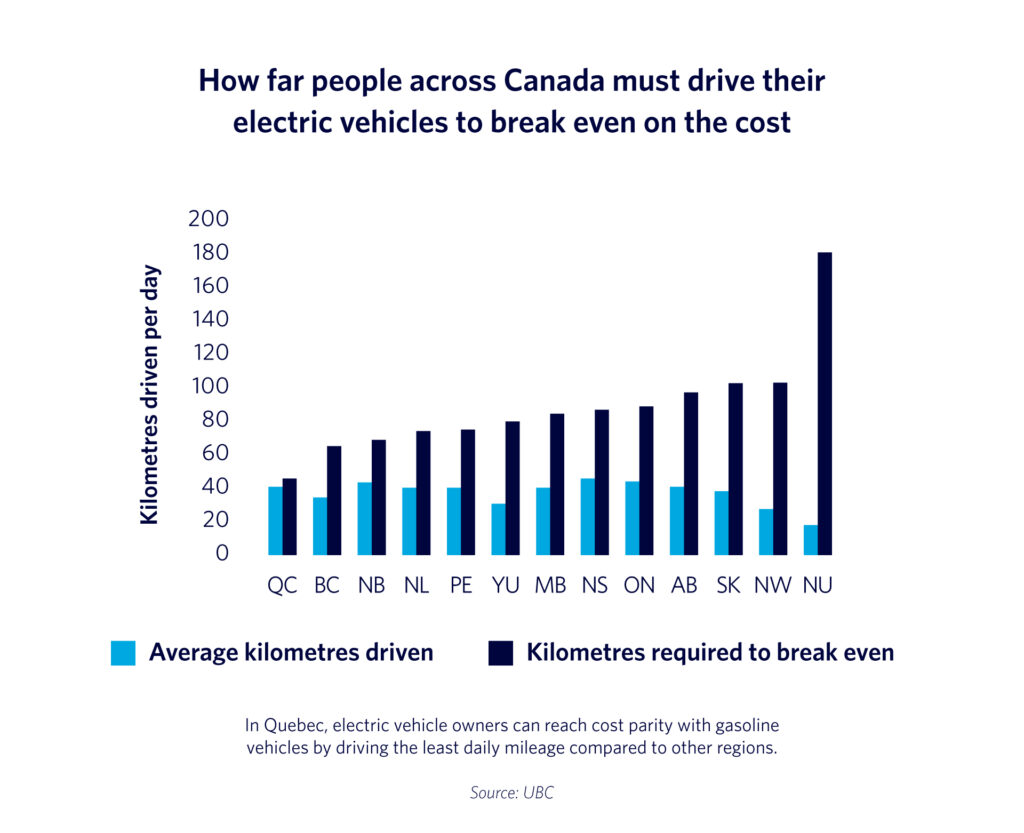
Are you thinking of buying a pricey electric vehicle but aren’t sure if the costs will be worth it in the long run? UBC researchers crunched the numbers in a new study, and it might be good news if you commute from Abbotsford to Vancouver every day.
The magic number is 64 kilometres per day to break even (about an hour on the highway), and you’d have to drive that for seven years for the costs to align with their gas-guzzling counterparts.

Spatial variation of breakeven VKT relative to Quebec. (UBC)
“In British Columbia, comparing a Hyundai Kona electric versus gasoline would cost about $8,000 more for the latter after a seven-year ownership period,” study author Bassam Javed told Daily Hive. Basically, the more you drive, the more you save.
Javed, along with authors Milind Kandlikar and Amanda Giang, compared the distances by provinces, too, factoring in varying things like tax rebates and charging costs, which can increase if you live in a colder climate or pay more for electricity.
While our province sure does seem to have a lot of Teslas on the streets, Quebec was actually found to have the biggest cost advantage for EV ownership, followed by BC and Manitoba. Researchers didn’t look at hybrids in this study, only battery electric vehicles.

UBC
“Since electricity is cheaper per energy unit in Quebec than the price of gas, the net differential in the sensitivity calculation for the same reduction in temperature favours EVs, even though the efficiency effect favours [internal combustion engine vehicles],” the study found.
It also found that maintenance costs were lower in electric vehicles.
Plus, the costs definitely improve in your favour if you get a smaller, basic vehicle versus an electric truck or a luxury car.
“For a Wealthy Consumer willing to switch from a luxury compact SUV ICEV to one of the two smaller EVs, there [are] cost savings of $32k to $55k in NPV. The Budget-Constrained Consumer with sufficient budget for a luxury full-size SUV ICEV would save $19k to $80k in NPV by switching to smaller EVs,” the study found.
According to the study, the average driver only stays behind the wheel of the same car for about six years.
But, while researchers were able to break it down into a dollar amount, they point out that there’s more work to be done to make electric vehicles more affordable.
“[In] exploring exactly who wins or loses in the era of transition to EVs, we can glean insights on where policymakers can look to next for increasing EV adoption.”
Such as carbon pricing.
“In the absence of purchase subsidies, a carbon price may be key to increasing the adoption of EVs: The combined effect of a carbon tax of $170 CAD per tonne (expected by 2030) and plausible purchase price reductions could help adjust the total costs of ownership of an EV versus an ICEV when purchase subsidies end,” the researchers wrote.
BC carbon tax fight
The study comes as BC braces for another carbon price increase in April, which will be about 18 cents per litre of gasoline. Diesel drivers will pay even more, and the tax is only a portion of the full tax rate, which differs by region.
The province says it returns the money to eligible taxpayers through rebates to offset the costs.
The carbon tax is something that has become a political point of contention between BC’s Premier David Eby and Conservative Leader Pierre Poilievre after his efforts to get the province to scrap the tax.
BC’s carbon tax was the first in the country and, therefore, was implemented differently than most other Canadian provinces, which fall under the federal tax, which was implemented much later. Eby said Poilievre’s efforts to get BC to end the tax would mean less money for British Columbians, not more.
“I received a letter from the Leader of the Opposition, Pierre Poilievre, this morning,” Eby said on Friday. “He is advising that British Columbia should let the federal government administer the carbon tax instead of administering it ourselves.”
“The fact that we face is that if we followed Mister Poilievre’s suggestion… there would be less money returned to British Columbia on April 1st than there would be if the federal government administered this increase directly. I don’t live in [the] Pierre Poilievre campaign office and baloney factory. I live in British Columbia. I’m the premier. Decisions have consequences,” he added.

